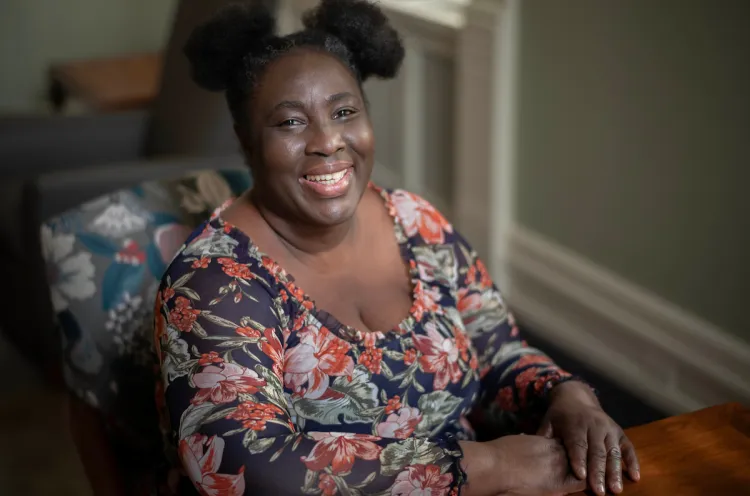Staff Member Benedicta Delima Advocates for Ghanaian Widows in Powerful Memoir

“Even though we have escaped the darkness that befell us,” says Delima, “my son and I are devoted to a lasting solution to the suffering of surviving spouses in Ghana.”
Benedicta Delima, a Swarthmore College Environmental Services technician, is also an author and advocate who supports hundreds of widows facing violence and hardship in her home country of Ghana.
Having personally endured disenfranchisement and societal neglect as a widow there, Delima has made it her mission to alleviate the severe hardships that widows in Ghana face. In 2023, she launched a nonprofit, Benedicta and Sonnie's Tears and Pains (BSTP) and self-published a powerful memoir, Widow and Son: The Tears and Suffering of a Widow and Son from Ghana.
“Widows in Ghana are accused of causing their husbands’ deaths, labeled as ‘witches,’ beaten, and driven from their homes,” Delima says. “Despite this, they are expected to raise their children alone, often without any familial, social, or legal support. Many live below the poverty line, struggling to afford basic necessities like food, shelter, and health care.”
In her memoir, Delima recounts her harrowing experiences in Tema, Ghana. Following her husband’s death in 2015, Delima says that her in-laws threatened her, accused her of stealing gold, and repeatedly attempted to take custody of her son, Sonnie. Fearing they would abduct Sonnie, Delima sought help from the U.S. Embassy and was able to safely leave Ghana and settle in Pennsylvania. She joined the College’s staff in 2019. Delima’s experiences inform her advocacy for policy change and enduring commitment to uplifting her “widow sisters” who are still facing isolation, poverty, and violence in Ghana.

Book cover ofWidow and Son: The Tears and Suffering of a Widow and Son from Ghana, featuring a photograph of Delima’s father.
Several Swarthmore students have volunteered to support Delima’s work. Yatin Lala ’24, who graduated with a B.A. in cognitive science and computer science, created a website for BSTP; Narimen Zorgui ’25, a Global Studies major from Tunisia with a focus on the Middle East and North Africa, profiled Delima for The Phoenix. Rolice Yulan ’26 an anthropology major from China, and Elizabeth Agyei ’25, a biology major from Newark, N.J., organized a fundraising event at the Hormel-Nguyen Intercultural Center in December. Students, faculty, staff, and Swarthmore residents enjoyed a Ghanaian dinner that included fufu, jollof, and goat meat stew at the IC while Agyei read passages from Delima’s autobiography, and then Delima gave a presentation.
At the IC event, Delima described how, in the wake of a spouse’s death, the deceased’s extended family are permitted to forcibly enter their relative’s home to collect their belongings as well as any other items they choose.
“In the process, they can also steal items belonging or willed to the surviving spouse, including money,” she said, “and withhold vital documents that might open the door for claims to any belongings of the deceased, including money in the bank.”
In addition, Delima says many widows are often besieged by their spouse’s family while grieving. Extended families may even take the spouse’s body, refusing to inform the widow of its burial place. To this day, Delima lives with the anguish of not knowing her husband’s final resting place.
While harsh treatment of widows is not explicitly legal, Delima says the Ghanaian government has no protections in place to prevent it. She hopes to influence the Ghana Bar Association to advocate that parliament create legal protections for widows and their children. The country’s current intestate succession law is supposed to take care of a surviving spouse if someone dies without a will, but Delima says that extended family members do not respect the law. As a result, many families are broken apart and displaced from their homes, and children are alienated from their extended families. Based on her own experience and those of widows who she speaks to, Delima says authorities often turn widows away when they try to seek legal recourse or protection.
Delima’s late father, Ignatius de Paul, served as a lawyer and magistrate for 40 years. She credits him as a significant factor in her survival after the death of her husband. Most Ghanaian women, she says, are largely illiterate and do not have access to their country's constitution. Delima believes the country’s constitution should be published in all of Ghana’s 70 Indigenous languages so that it is accessible to everyone.
BSTP has already made strides, supporting 400 women and their children by organizing hospital trips, paying for medical appointments, and providing groceries and rent support. On YouTube, Delima shares interviews with the women of all ages who are involved with the organization. Moving forward, she and her supporters are raising funds to continue providing basic necessities for more widows across Ghana, expand community programs, purchase a vehicle for transporting widows to the hospital, and partner with local organizations to offer skill training that will help widows achieve financial independence through activities like soap-making, catering, and sewing.
“Even though we have escaped the darkness that befell us,” says Delima, “my son and I are devoted to a lasting solution to the suffering of surviving spouses in Ghana.”



